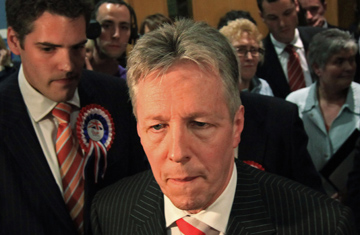
Northern Ireland's First Minister Peter Robinson reacts after losing his Belfast East seat to Naomi Long of the Alliance Party, in Belfast, Northern Ireland, on May 7, 2010.
During Northern Ireland's election campaign, the leaders of the Protestant parties promised voters a breakthrough. For too long, they argued, Northern Ireland's 18 MPs — who make up only 3% of the total seats in the House of Commons — have been overlooked at Westminster. Peter Robinson, Northern Ireland's First Minister and leader of the Democratic Unionist Party (DUP), promised that his party's MPs, as the fourth largest group in parliament, would wield more clout than any other local party at Westminster, particularly if the result of the May 6 general election was as close as everyone predicted. Sir Reg Empey, leader of the more moderate Ulster Unionist Party, had claimed that his party's electoral alliance with the Conservatives would give Northern Irish voters a greater say in British affairs. But after a night that saw one of the most shocking results in Northern Ireland's electoral history, unionist leadership appears to have broken up rather than broken through.
DUP leader Robinson lost his East Belfast seat (which he had held for 31 years) to Naomi Long from the cross-community Alliance Party. The victory gives Alliance its first ever seat at Westminster. Robinson's vote had been expected to fall following recent scandals, but few had predicted he would lose. In January, Robinson temporarily stood down as First Minister after it was revealed that his wife Iris — a former MP — had allegedly obtained $80,000 from two property developers for a 19-year-old man with whom she had been having an affair. More recently, a BBC news report claimed that the Robinsons made a profit of more than $700,000 after buying a valuable piece of land from a property developer friend for just $8.
Following Iris's expulsion from the DUP in January following the revelations about her affair, Thursday night's result now leaves her husband's future in doubt. "This is the beginning of the end of Peter Robinson," says Anna Lo, an Alliance Party member of the Northern Ireland Assembly. "I can't see him continuing as DUP leader or as First Minister for much longer." Despite Peter Robinson's fall from grace, other DUP candidates performed well, and the party retained its eight remaining Westminster seats.
But for Northern Ireland's other main Protestant party, it was a dismal night in every sense. The Ulster Unionist Party entered into an electoral alliance with the British Conservatives last year and had fielded candidates under the banner of the Ulster Conservatives and Unionists New Force (UCUNF). The party failed to win any seats, with its leader Empey losing out to the DUP in South Antrim. The seat is a Unionist stronghold and many had expected Empey to defeat the DUP and win back the seat that his party had once held for over 15 years. Following his loss, Empey's days as party head are almost certainly numbered.
On the other side of Northern Ireland's sectarian political divide, there were fewer surprises. The Catholic-backed Social Democratic and Labour Party retained its three Westminster seats, while Sinn Fein — which abstains from taking its seats in Westminster because it refuses to take an oath of allegiance to the Queen — has kept each of its five seats.
The final seat to be declared was the most controversial — and closely fought — of the entire campaign. In the constituency of Fermanagh South Tyrone, the main Protestant parties had withdrawn from the contest in favor of a so-called Unionist Unity candidate, their aim being to oust Sinn Fein's Catholic-backed MP Michelle Gildernew. Sinn Fein suggested that the SDLP should also withdraw from the race and encourage their Catholic supporters to back Gildernew. SDLP leader Margaret Ritchie refused to do so, describing the proposal as a sectarian pact. After three re-counts of the ballot papers, Gildernew was re-elected with a margin of only four votes.
With the shape of the next British government looking increasingly uncertain, Northern Ireland's MPs could play a decisive role. The Conservatives have emerged as the largest party in Westminster but with insufficient seats to form an outright majority, meaning they will need the support of smaller parties to function as a majority government. This could leave the Conservatives in the embarrassing position of having to negotiate a deal with the DUP, since their controversial merger with the rival Ulster Unionist Party failed to win them any additional seats. To make matters more awkward, the DUP's election campaign was centered on their refusal to make a deal with any Westminster party. That may soon change. "I expect [Conservative leader] David Cameron to come knocking on our door soon," says Peter Weir, a DUP member of the Northern Ireland Assembly. "And if he does, we will use the opportunity to get the best deal for the people of Northern Ireland."
In an interview during the campaign, Cameron said Northern Ireland's public services would be the target of spending cuts under a Tory government as part of a wider plan of efficiencies to help the U.K. recover from recession. This would inevitably entail a reduction in the $14 billion block grant that the British Exchequer pays to Northern Ireland each year. Should the DUP find itself bargaining with the Conservatives, the Northern Irish party would almost certainly demand the retention of the block grant.
With most powers now devolved to Northern Ireland's own parliament at Stormont, outside Belfast, Westminster has less influence over day-to-day affairs than ever before. But after this election's shock result and failed alliances, Northern Ireland's unionist parties and, by extension, the province's power-sharing set-up, has taken on an air of instability.
